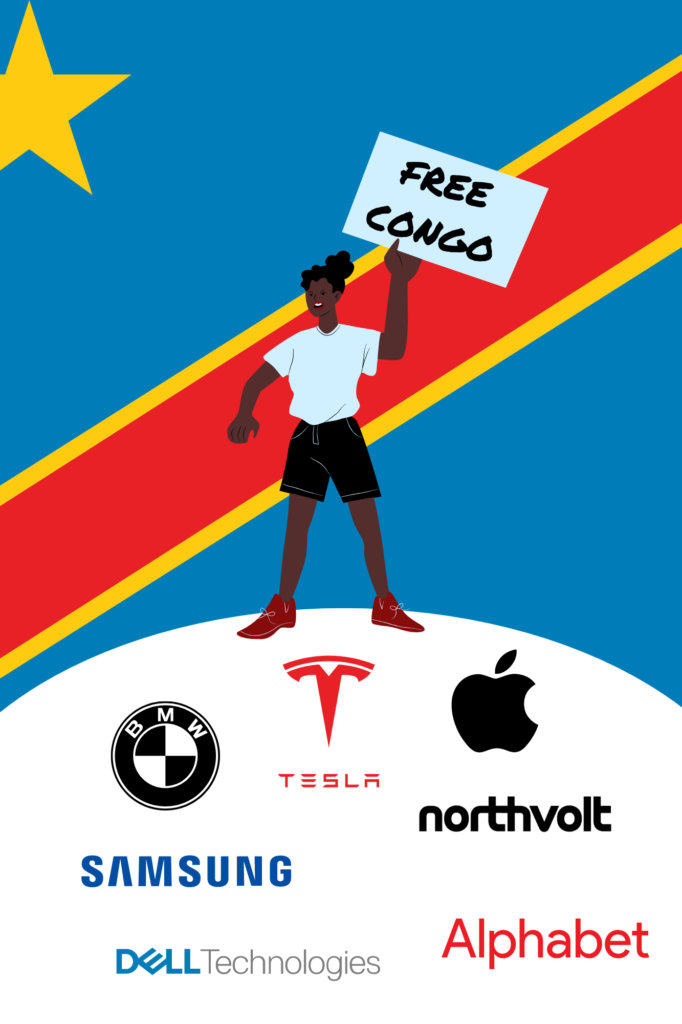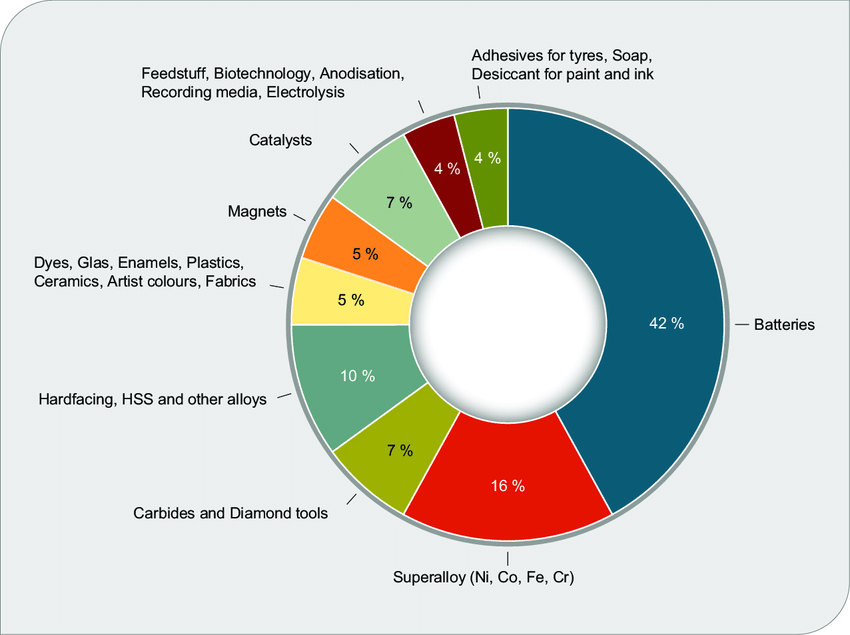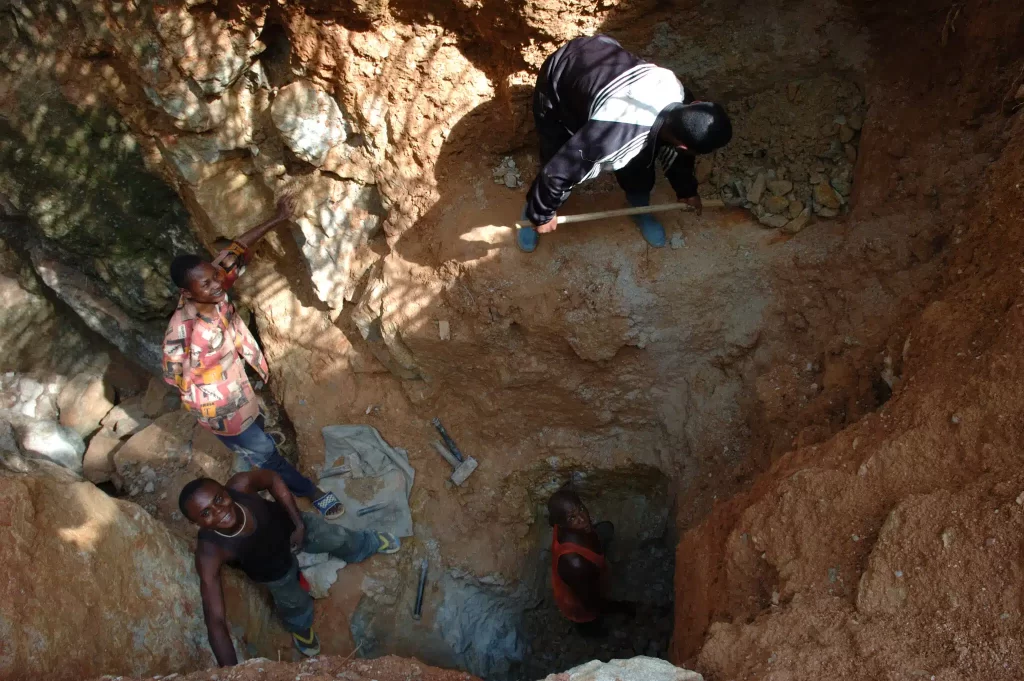
Global companies have long profited off Congo’s resources with the help of wealthy nations, to the detriment of Congolese people. The Democratic Republic of Congo (DRC) is one of the richest countries in natural resources but ironically happens to be one of the poorest countries in the world (Kara 2022).
How the Demand for Cobalt Grew
Congo has an abundance of natural resources including: zinc, iron, tin, nickel, manganese, germanium, tantalum, tungsten, uranium, gold, silver, diamonds and lithium (Kara, 2022). Congo holds more reserves of cobalt than the rest of the planet combined. As the world moves away from fossil fuels, countries like China, Russia and the United States look to Congo for their cobalt reserves (Davey 2023).

(Naeher 2017)
Cobalt is essential for military equipment. During World War I, cobalt was used in high-speed precision tools and permanent-magnet alloys (Gulley 2022). After realizing the significance of cobalt for the military, the United States passed The Strategic and Critical Materials Stockpiling Act in 1946 which required for cobalt to be held for military and industrial purposes (Strategic and Critical Materials StockPiling Act 1939) .
The increased demand precipitated a significant shift in the global cobalt market, with various nations vying for access to this strategic resource. After World War II, the demand for cobalt grew due to its use in jet engines and propulsion systems for nuclear weapons (Gulley 2022). China was among the numerous nations that contributed to the surge in cobalt demand. Chinese firms invested in cobalt mining production which contributed to its 20% compound annual growth rate (Gulley 2022). Wealthy countries rely on China to bring in new and advanced technology like iphones and Teslas for them while China relies on the cheap and sometimes free labor of Congolese men, women, and children (Faber et al, 2017).
Companies like Apple and Tesla exploit the cobalt reserves of Congo to produce lasting batteries (Kara 2022). In 2020, 64 % of refined cobalt was used for phone batteries (Gulley 2022). The demand for cobalt has only increased and it is going to continue increasing. Such companies and their respective nations bear significant responsibility for the modern-day slavery system and environmental damages in Congo (Kara 2022).
One Sided Deals
Chinese companies have repeatedly exploited Congo’s cobalt resources without fulfilling their commitments, underscoring the urgent need for fair and transparent agreements that prioritize the interests of Congolese people. In 2007, Joseph Kabila, former president of Congo, signed a deal with Chinese companies which gave them ownership of 15 cobalt mines. In exchange for the deal, the Chinese companies promised to build infrastructure but they did not hold their end of the deal (Gross 2023). Peter Zhou, a Chinese financer explained that “there is corruption, there is lack of the rule of law, which gives you more autonomy to be entrepreneurial” (Niarchos 2021). The Chinese companies were aware of Congo’s instability and used that to exploit their cobalt.
In recent news, current president of Congo, Felix Tshisekedi, is working on a new $7 billion deal with Chinese corporations. Tshisekedi and his team are negotiating the deal signed by Joseph Kabila in 2007, which was criticized for primarily benefiting Chinese companies, as they allegedly failed to fulfill their obligations to build infrastructure as outlined in the agreement (Livingstone 2024).
Modern-Day Slavery like Conditions

Congolese men, women and children are forced to work and survive off less than 2 dollars a day (Carret, et al. 2022). Children as young as 5 years old work in the mines for 12 hours a day. 11% of children work in cobalt mines and 23% work in other mines; 13% of these children are under 18 years old with 51% being 15-17 years old, 41% are 10-14 years old and 8% are younger than 10 (Faber et al, 2017). The second children enter the mines, their innocence is lost.
Furthermore, mines are dangerous places for women as there are high rates of human trafficking and sexual assault (Kara 2022).
Those working in cobalt mines have high levels of cobalt in their blood and urine due to inhaling the dust particles from mining. For the children, they are exposed to chemicals that cause DNA damage (Nkulu et al, 2018). When interviewed about working in the mines, young boys complained of itching and burning and pain all over their bodies (Kara 2022).
Environmental Damages
The transition to clean energy, particularly the shift from traditional fossil fuel-powered vehicles to electric vehicles (EVs), is a significant step in combating climate change and reducing air pollution. However, in the Democratic Republic of Congo (DRC), renowned for its wealth in minerals such as cobalt—a vital component in electric vehicle batteries—concerns have arisen regarding the environmental and social ramifications of heightened mining activities (Davey 2023).
Cobalt mining is tied to various other forms of environmental pollution such as:
· toxic dumping
· water pollution
· vanish of fish
· Contaminated Crops
Awareness and Accountability
The United Nation’s 1948 Universal Declaration of Human Rights claims to protect everyone, not just those in developed countries. Congolese people deserve their basic human rights of liberty, property, safety and the freedom to resist oppression.
Not enough people know about the exploitation Congo has suffered and is still suffering from wealthy companies. Most Americans admit that they have no idea where their Apple products are made, even while 90% are aware that the products are made overseas (Connelly 2022). It is the companies’ responsibility to inform their consumers about where their products come from. By having this information, consumers might start thinking more about how they get their products, and this would lead to them making sustainable choices.
Using recycled materials is another route to sustainability. Instead of tossing old or broken iphones away, users should take them to local Apple stores so that they can reuse the material in the phone. Companies can also pursue using cobalt free batteries.
For the public, protesting the exploitation of Congo’s resources and unfair working conditions can also shed light on the issue and help push for federal legislation. Congolese people should be making fair wages that allows for them to provide for their families. Minors should not be working in the Cobalt mines or any other mines. The United States has introduced a bill that would ban imported goods that are the result of child labor and other abusive matters (Taiwo 2023). This would be a major step for Congolese people.
There is hope for Congo and it is up to us to educate ourselves on the current issue, spread awareness, hold the companies accountable and push for legislation. Knowing what is happening in Congo is not enough; it is what we do with the knowledge that matters.
References
Africa Defense Forum. 2023. Chinese Mining ‘Wrecking Lives’ In DRC. https://adf-magazine.com/2023/10/chinese-mining-wrecking-lives-in-drc/
Carret Jean Christophe, Kadima Olga. 2022. A social contract for improving the lives of the Congolese people. Africa Can End Poverty. https://blogs.worldbank.org/en/africacan/social-contract-improving-lives-congolese-people#:~:text=The%20lives%20of%20most%20Congolese,poor%20citizens%20than%20in%202003
Connelly, Majorie. 2021. Poll Finds Consumer Confusion on Where Apple Devices Are Made. The New York Times.
Kaloi, Stephanie. 2023. Apple’s Tim Cook Tells Dua Lipa ‘We Can’ Guarantee Children Aren’t Mining iPhone 15’s Cobalt. The Wrap. https://www.thewrap.com/apple-iphone-cobalt-tim-cook-dua-lipa-children-miners-labor/
Kara, Siddharth. 2022. Cobalt Red: How the Blood of the Congo Powers Our Lives.New York: Macmillan Publishers Press
Davey, Charlotte. 2023. The Environmental Impacts of Cobalt Mining in Congo. Earth.Org. https://earth.org/cobalt-mining-in-congo/#:~:text=Studies%20have%20shown%20that%20the,by%20the%20extraction%20of%20cobalt
Faber, Benjamin, Krause, Benjamin, and Sanchez Raul. 2017. Artisanal Mining, Livelihoods, and Child Labor in the Cobalt Supply Chain of the Democratic Republic of Congo. UC Berkeley: Center for Effective Global Action. https://escholarship.org/uc/item/17m9g4wm#author
Gross, Terry. 2023. How ‘modern-day slavery’ in the Congo powers the rechargeable battery economy. Goats and Soda
Gulley, Andrew L. 2022 One hundred years of cobalt production in the Democratic Republic of the Congo. https://www.sciencedirect.com/science/article/pii/S0301420722004500
Livingstone, Emmet. 2024. Uncertainties Remain With Renegotiated Chinese Mining Deal in DRC Voice Of Africa. https://www.voanews.com/a/uncertainties-remain-with-renegotiated-chinese-mining-deal-in-drc-/7458908.html